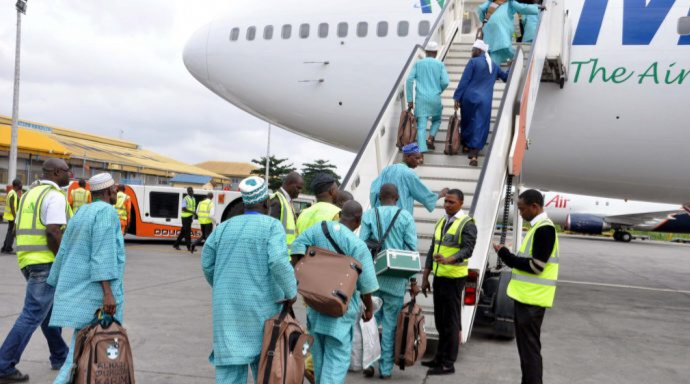By Mustapha Adebayo Bello
My attention was drawn by one of those who have been reading my commentaries on this year’s Hajj to the Guardian’s Big Story of Friday July 21, 2023 under the title “Tears, complaints trail Nigeria’s N304b capital flight to Mecca”. Though, the Information and Public Relations arm of NAHCON has officially reacted and debunked some of the fallacies being peddled as the truth about Hajj 2023 with facts and figures, I still feel a sense of duty to offer my own opinion as an active participant in this Hajj and a stakeholder. The charge of capital flight to the tune of N304b of Nigerian wealth to Saudi Arabia is not only mischievous but laughable.
Capital flight in economics is defined as money rapidly flowing out of a country due to an event of economic consequence or as the result of a political event such as regime change or economic globalization. It is also used to describe a situation where humongous money leaves a country for goods and services that are available locally or can be made available if improvement is sought through capacity building. From this understanding, it’s difficult for me to see which aspect of Hajj constitutes capital flight to the national economy as opinioned by the writers. In terms of airlifting, Air Peace, Azma Air, Max Air, Aero Contractor and Arik Air are all Nigerian private airlines contracted to fly the over 90,000 pilgrims to and from Saudi Arabia thereby making money for themselves and adding to the aviation industry’s contribution to the GDP of the country. Even Flynas, the Saudi Based airline involved in the process has some Nigerian interests in its shareholding profile. As for feeding and accommodation, no country (not just Nigeria) enjoys the privilege of maximizing economic gains from them to itself except the host country Saudi Arabia which provides the services exclusively.
To the Muslims Hajj is a fundamental pillar of Islam which no economic condition or government restrictions can hinder them from fulfilling. Prior to the establishment of government controlled pilgrims welfare boards, Muslims have been going on Hajj even on foot without any external facilitation. Hajj is an annual religious event willfully performed by them not as a result of any economic consequence, political event, regime change or economic globalization. Except for the global shutdown occasioned by COVID 19 which restricted its performance in 2020 and 2021, Muslims from different countries of the world have been going on Hajj from time immemorial and would continue to do so even in the worst of their local economics because there is no alternative to it in their homelands. Therefore, I cannot understand how any of the expenses joyfully incurred by the Nigerian pilgrims in the cause of fulfilling their religious belief which is guaranteed by the constitution would be seen by any discerning person as capital flight. Hajj is not tourism in the way most non-Muslims see it and those who kept on seeing it from that lenses are either too lazy to research about Islam or too paranoid to understand the religious sensibilities of the Muslims.
If the writers are so concerned about stemming the tide of capital fight occasioned by tourism of different kinds, they should engage government to develop its tourism potentials instead of getting obsessed with Hajj. They should allow Muslims to breathe as Hajj is not the reason why our foreign reserve is depleted or our GDP is stagnant. What should be of more concern to them is the million dollars lost to telecommunication service providers, digital television stations and other multinational companies in the face of local alternatives. Nigerian economy would grow faster if all of us as a matter of conscious decision jettison goods and services of foreign countries and embrace our local brands. We should start making our calls and use data with Glo line, buy our automobiles from Innoson, fly Air Peace, wear Dakova, buy Dangote products, follow Enyinba and 3sc instead of financially benefitting their foreign alternative brands that many of us are obsessed with.
On an individual level, the writers are also oblivious of the fact that Hajj provides some of the pilgrims’ with economic opportunities particularly after the completion of the rites. I am sure this would come as surprise to the likes of these writers because of their ignorance about the demands of Allah on the pilgrims as regards Hajj. In the language of the Qur’an, Hajj apart from the primary spiritual objective is institutionalized to provide pilgrims with the possibilities of “witnessing things that are of benefits to them and some worldly gain from trade”. Consequently, many of them who have the financial wherewithal take advantage of this scriptural leeway to import textiles, garments and other legal items to the country to enhance their economic status when they get home. Besides, how would any discerning person describe an institution which provides full and part time employment for Nigerians as administrators, logistic managers, tour guides, translators and religious clerics as being responsible for capital flight out of the country? Therefore, it amounts to lazy journalism to leave substance and be chasing shadows in matters of capital flights from Nigeria.
As for the tears and complaints which the writers sensationalized to achieve dubious end, I need not reiterate the true picture of the situations which informed the noticeable difficulties experienced by the pilgrims because it has been well explained by informed observers who were on ground at the Mashair-l-Haram. But it is suffice to ask the writers (if they so wish) to conduct an empirical research on the disposition of those pilgrims who complained about the inadequacies of this year’s Hajj. They would be shocked to find out that most if not all the affected pilgrims would gladly return to Makkah next year under the same condition if given the opportunity. What we are saying is that as much as there are genuine concerns over tent allocations and feeding which are being addressed by NAHCON in concert with the Saudi authorities, those inadequacies are not enough for Muslims to be dismissive of the importance of Hajj in their lives. In all, Hajj is the business of the Muslims and those who are charged with the responsibility of informing the populace should always strive to unearth the truth without embellishing it with personal primordial sentiments.
Ends









